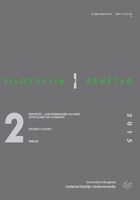The Ontological Indifference. A Realist Reading of Kant and Hegel
The Ontological Indifference. A Realist Reading of Kant and Hegel
Author(s): Jure SimonitiSubject(s): Philosophy
Published by: Institut za filozofiju i društvenu teoriju
Keywords: Kant; Hegel; realism; totality; de-totalization; indifference
Summary/Abstract: The article challenges the first premise of „speculative realism“, according to which, with Kant, the contact with the outside world was lost. Instead, it will be shown that the possibility of realism received its major impulse from two grand figures of German Idealism, from Kant as a precursor of the Romantic period and from Hegel as its, albeit critical, philosophical culmination. Based on three possible relations of knowledge to its outside, three ontologies will be distinguished, the ontology of immediacy, stretching from rationalists to the last empiricists, Kant’s ontology of totalization, and, finally, Hegel’s „ontology of release“ or „de-totalization“. As opposed to Descartes’s thing being constantly doubted in its existence, as opposed to Malebranche’s occasion being invariably induced by God, as opposed to Leibniz’s monad being an immediate embodiment of an idea, as opposed to Berkeley’s object vanishing when not perceived, and as opposed to Hume’s world lacking necessity, Kant philosophically warranted a world that does not have to be perpetually verified and can, hence, exist devoid of ideas produced by God and outside the constancy of the human gaze. Kant secured the normal and necessary existence of the world behind our backs and procured us with the common-sense normality of the world, but it was only Hegel’s absolute subjectivism that granted us the first glimpses into the radical meaninglesness of the facticity. It was not until Hegel’s logic of indifference of the notion to its immediate content that an egress of the circle of Kant’s totalization was made possible.
Journal: Filozofija i društvo
- Issue Year: 26/2015
- Issue No: 2
- Page Range: 369-391
- Page Count: 23

